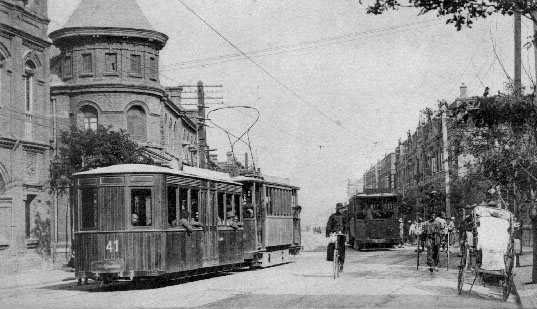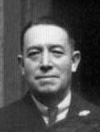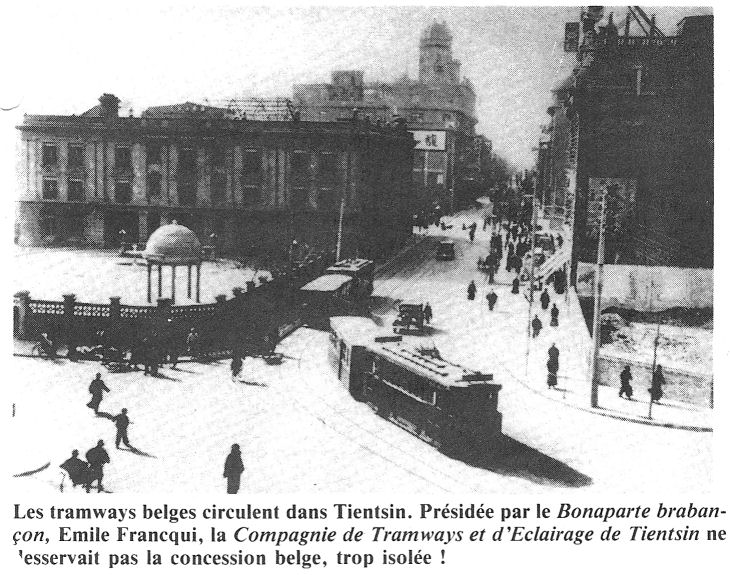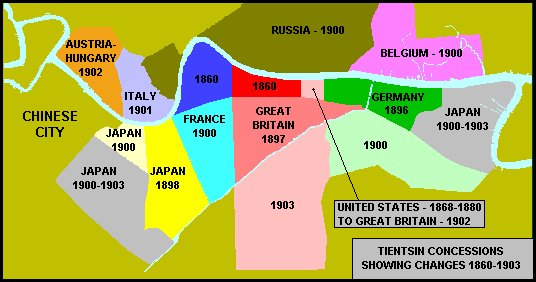
HISTOIRE DE TRAMS à TIENTSIN
et nos familles

Lorsqu’Emile Francqui, l’ex-consul belge de Hankou, revint en Chine en 1902, il réalisa habilement plusieurs opérations financières dont la plus notoire fut l’acquisition d’une concession de travaux pour la construction de tramways à Tianjin. Pour réaliser l’entreprise, on constitua la même année, à Bruxelles, la Compagnie internationale de Tramways et d’Eclairage de Tientsin. La concession fut ratifiée par le gouvernement impérial moyennant le rachat des installations par la Chine après vingt ans d’exploitation. Douze kilomètres de lignes étaient déjà contruits en 1908 ; ce furent les premiers tramways installés en Chine.
(Encres de Chine, N°5 – juin 1987)
Note de l'éditeur: en fait, il y avait déjà eu des installations à Pékin qui ne furent exploitées que pendant un an, détruites immédiatement lors de l'insurrection dite des "Boxers".
When Emile Francqui, the Belgian ex-consul of Hankou, returned to China in 1902, it skilfully carried out several financial transactions of which most notorious was the acquisition of a sub-contracting for the construction of trams with Tianjin. To carry out the company, one constituted the same year, in Brussels, the international Company of Trams and Lighting of Tientsin. The concession was ratified by the imperial government with the help of the repurchase of the installations by China after twenty years of exploitation. Twelve kilometers of lines were already contructed in 1908; they were the first trams installed in China.
(Encres de Chine, N°5 – juin 1987)
Nous devons à Monsieur Roland Dussart-Desart, passionné de tramways et de leur histoire, sensibilisé à la qualité documentaire de notre site, une documentation inespérée et pointue sur l’implication pléthorique des Splingaerd, Paternoster et des Pourbaix dans le fonctionnement de la CTET (Compagnie internationale de Tramways et d’Eclairage de Tientsin).
We have to from Mr Roland Dussart-Desart, impassioned trams and of their history, sensitized with the documentary quality of our site, an unhoped-for and pointed documentation on the plethoric implication of Splingaerd, Paternoster and of Pourbaix in the operation of the CTET (international Company of Trams and Lighting of Tientsin).
Qu’il en soit ici remercié. Non seulement il nous donne des précisions remarquables concernant la carrière des membres impliqués de notre famille, mais également des traits biographiques dont l’état des déportations dans les camps japonais pendant l’époque mouvementée de l’occupation japonaise en Chine et la guerre du Pacifique qui sont les facteurs de l’éclatement de la famille dans le monde.
Effectivement, à notre connaissance, les derniers ressortissants d’origine européenne des familles étudiées ont progressivement quitté la Chine et le Japon dans les années qui suivirent la WWII. Destination : la Belgique, l’Italie, le Vénézuela, les USA, l’Australie, la France ……… en passant par la Grande-Bretagne ou le Mexique, etc.
That it is thanked here for it. Not only it gives us remarkable precise details concerning the career of the implied members of our family, but also of the biographical features of which the state of the deportations in the Japanese camps during the animated time of the Japanese occupation in China and the war of the Pacific which are the factors of the bursting of the family in the world.
Indeed, to our knowledge, the last nationals of European origin of the studied families gradually left China and Japan in the years which followed the WWII. Destination: Belgium, Italy, Venezuela, the USA, Australia, France......... while passing by Great Britain or Mexico, etc.
Il se fait que les dossiers du personnel de cette société dissoute depuis longtemps se trouvent à Bruxelles, aux Archives Générales du Royaume (plus de mille dossiers). La qualité de ces dossiers est très variable, nous dit Roland Dussart-Desart : on y trouve de la correspondance, des contrats, des feuilles de paye, des appréciations de personnalité…..
Les dossiers sont établis selon trois catégories de personnel : première catégorie, etc. Seul Jean-Baptiste Splingaerd fera partie de la première réservée aux cadres dirigeants. Les autres membres de la famille seront répartis en cadres inférieurs ou personnel européen non dirigeant.

La CTET ne faisait vraiment confiance qu’à des Belges. Quoi de plus naturel qu’elle rassemble des Belges d’Orient, connaissant le terrain, les us et la langue, et que ceux-ci nouent entre eux des liens étroits ?
The CTET made really confidence only with Belgians. What could be more natural than it gathers Belgians of the East, knowing the ground, the customs and the language, and than those tie between them close links?
Jean-Baptiste (dit John) Splingaerd , déclaré né à Lanchowfu (Kansu) le 24/12/1891 (sic). Il est ici rajeuni de trois ans car sa sœur Thérèse étant née en 1891, cela saute aux yeux qu’il y a un problème. En fait, il est probablement, non pas né à Lanchowfu (qui est Lanzhou, chef-lieu de la province du Gansu) mais à Suzhou, dans la même province, le 27 décembre 1888. Déclaré fils de Paul, il fut employé aux douanes chinoises de 1911 à 1913 (il avait fait ses études en Belgique au collège Saint-Boniface). Employé ensuite au Peking Syndicate (chemin de fer) de 1913 à 1928 et enfin chef de bureau aux Affaires chinoises de la CTET de 1929 à 1946. John dirigeait le « service social » qui consistait à gérer un secrétariat (journaux, courrier chinois), à arranger les différends avec les clients ou le personnel chinois et à gérer l’"Intelligence service" qui consistait à avoir des attaches dans les bureaux et à savoir ce qui se passe au syndicat. Créé après la grève de 1929, ce service a pris une très grande importance, au point d’être jugé dangereux par la direction, laissée dans l’ignorance de ce qui se passait dans ce service. En général, John Splingaerd renonçait à prendre son congé en Europe, ce qui lui valait chaque fois une compensation financière. En fait, John était apprécié pour sa connaissance de la langue mais surtout des coutumes chinoises, ce qui faisait de lui un excellent entremetteur (et aussi un excellent distributeur de « commissions »). Il fut licencié le 20 mai 1946 (l’entreprise, confisquée par les Japonais en 1943, passa aux Chinois en 1945 qui ne laissèrent pas le CTET reprendre ses biens). Il est décédé le 28 juin 1948 après deux mariages. Il n’avait que 59 ans. Il n'a pas eu d'enfant probablement à la suite d'une syphylis qu'il avait contractée dans sa jeunesse. Une plaque sur sa maison à Tientsin nous apprend qu'il avait un nom chinois: Lin ZiXiang (林子香)

Jean-Baptist (known as John) Splingaerd, declared born in Lanchowfu ( Kansu) the 24/12/1891 (sic). It is renovated three years here because his sister Thérèse having been born in 1891, that jumps to the eyes that there is a problem. In fact, it not was probably, born in Lanchowfu (which is Lanzhou, chief town of the province of Gansu) but with Suzhou, in the same province, December 27, 1888. Declared son of Paul, he was employed with the Chinese customs of 1911 to 1913 (he had made his studies in Belgium with the Saint-Boniface college). Employee then in Peking Syndicate (railroad) of 1913 to 1928 and finally head clerk to the Chinese Businesses of the CTET of 1929 to 1946. John directed the "social service" which consisted in managing a secretariat (newspapers, Chinese mail), to arrange the dispute ones with the Chinese customers or personnel and to manage the “Intelligence service" which consisted in having fasteners in the offices and with knowing what occurs to the trade union. Created after the strike of 1929, this service took a very great importance, at the point considered to be dangerous because of the direction, left in ignorance from what occurred in this service. In general, John Splingaerd renounced to take his leave in Europe, which was worth each time to him a financial compensation. In fact, John was appreciated for his knowledge of the language but especially of the Chinese habits, which made of him an excellent intermediary (and also an excellent distributor of "commissions"). He was laid off (to dismiss) on May 20, 1946 (the company, confiscated by the Japanese in 1943, passed to the Chinese into 1945 which did not let the CTET take again its goods). He is deceased on June 28, 1948 after two marriages. He was only 59 years old. His chinees name was Lin ZiXiang (林子香).


A suivre... To follow with: Paul Splingaerd jr, Joseph Splingaerd, Albert Paternoster, Remy Paternoster, Paul Pourbaix sr, Lucien Pourbaix, Laurent Pourbaix
click to follow or close the window ![]()
Fermer cette fenêtre pour revenir au menu - Close this window to continue
![]()
Christian Goens - La Louvière - Belgium - 2007 - tous droits réservés
june 2011 - 16-Jul-2016